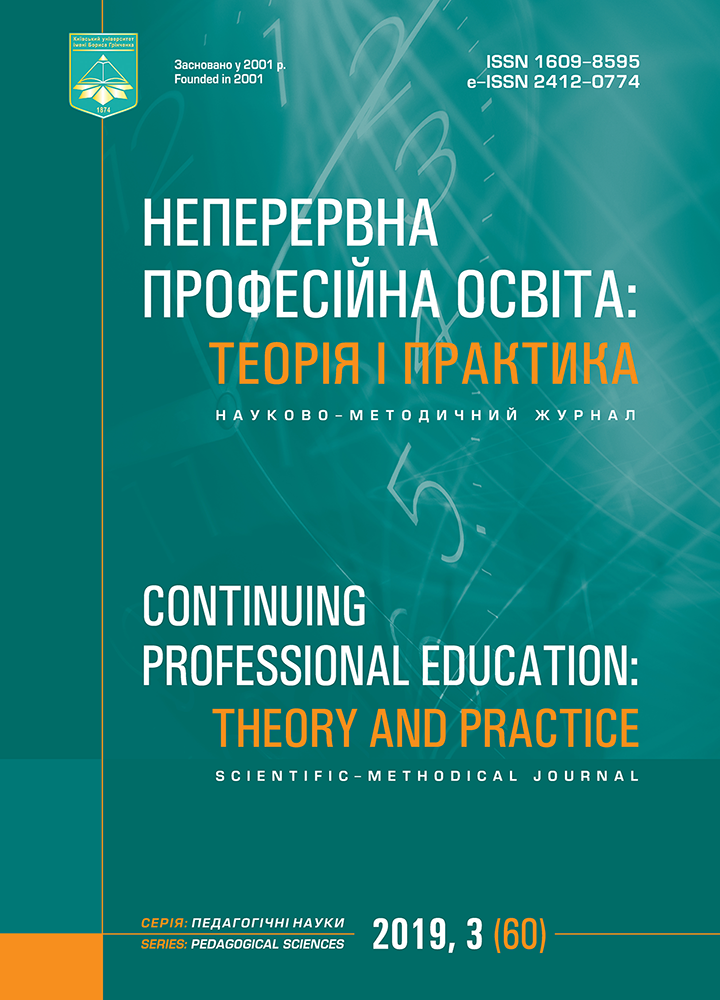ACADEMIC INTEGRITY IN THE CONTEXT OF EUROPEAN PRACTICES: THE EXPERIENCE OF FRANCE
DOI:
https://doi.org/10.28925/1609-8595.2019.3.8894Keywords:
academic integrity, dishonesty, quality of education, transparency.Abstract
The issues of academic integrity and the trends in its development in the European context and in Ukraine have been analyzed in the article. The general and specific trends in the development of academic integrity of future specialists in Europe and in France in particular have been highlighted. The definitional analysis of the categories «academic integrity» and «transparency» has been carried out and the components of academic integrity have been considered. The academic integrity as a component of the quality of education and its provision at the legislative level in the European countries has been analysed. Academic integrity has been considered as certain moral and ethical principles that all members of a civilized educational and scientific community must clearly observe during teaching, learning and scientific activities. The issue of academic integrity has been pointed out as basic and relevant for modern higher education, science, culture and art in the period of global changes in society. The peculiarities of academic integrity development of future specialists have been characterized. Universal features of the development of academic integrity, such as multidimensionality, transparency, objectivity, motivation and the content of improvement, have been highlighted. The concept of academic dishonesty and its manifestation have been analysed. The concepts of plagiarism and its signs, as well as its interpretation in the European context, have been examined. The experience of the European countries in the development of academic integrity and working methods for increasing the level of academic writing to strengthen one’s own argumentation of the facts researched by the scientist, as well as to improve the quality of researchers’ scientific publications by observing the requirements for the scientific articles structure. The article deals with the importance of the introduction of educational on-line trainings on the correct justification and presentation of the author’s scientific achievements, the citation of the scientific works provisions and the dissemination of this practice among the educational community, partnerships between universities and business entities. The concept of a healthy academic culture and its expression has been disclosed. The experience of France in the development and maintenance of academic integrity has been considered.
References
Finikov, T. V. (Ed.) (2016). Akademichna chesnist yak osnova staloho rozvytku universytetu [Academic Honesty as Basis for Sustainable Development of University]. Kyiv, Ukraine: Tuxon (ukr).
Brovko, K., Durdas, A., Sopova, D. (2018). E-seredovishe yak skladova korporativnoyi kulturi v universitetah Francuzkoyi Respubliki [E-environment as a component of corporate culture at the universities of the French Republic]. Molod i rinok, 2 (157), 133–137. DOI: https://doi.org/10.24919/23084 634.2018.126962 (ukr).
Guzhva, O. O. (2012). Sho potribno znati pro plagiat: posibnik z akademichnoyi gramotnosti ta etiki dlya «chajnikiv» [What you need to know about plagiarism: a guide to academic literacy and ethics for dummies]. Retrieved from http://library.kubg.edu.ua/images/stories/Departaments/biblio/PDF/books_ac-gr.pdf (ukr).
Dobko, T. (2008). Akademichna kultura yak neobkhidna peredumova efektyvnoho upravlinnia suchasnym universytetom v umovakh avtonomii [Academic Culture as Necessary Precondition for Effective Management of Modern University in Conditions of Autonomy]. Duh i Litera, 19, Cpecialnij vipusk «Universitetska avtonomiya», 93–102 (ukr).
Zakon Ukrainy « Pro osvitu» [The Law of Ukraine On Education]. Retrieved from http://zakon2.rada.gov.ua/laws/ show/2145-19/page3 (ukr).
Indeks sprijnyattya korupciyi – 2018 [Corruption Perceptions Index – 2018]. Transparency International Ukraine. Retrieved from http://cpi.ti-ukraine.org/#/ (ukr).
Kalinovsky, Yu.Yu. (2012). Akademichna chesnist yak chynnyk pravovoho vykhovannia studentskoi molodi [Academic Honesty as Factor in Legal Education of Student Youth]. Gilea, 63, 477–482 (ukr).
Satsik, V. (2017). Akademichna dobrochesnist: mifichna koncepciya chi diyevij instrument zabezpechennya yakosti vishoyi osviti [Academic Integrity: A mythical concept or effective tool for quality assurance in higher education]. Retrieved from http://education-ua.org/ua/articles/930 (ukr).
Soroka, N. I. (2017). Plagiat yak odin iz vidiv porushennya avtorskih prav: yevropejskij dosvid [Plagiarism as a copyright infringement: the European experience.]. Teoriya i praktika intelektualnoyi vlasnosti, 4, 9–23 (ukr).
Berthet, V. (2016). Les 6 règles de l’honnêteté intellectuelle. Retrieved from https://www.linkedin.com/pulse/les-6-r%C3%A8gles-de-lhonn%C3%AAtet%C3%A9-intellectuelle-vincent-berthet (fr).
Code de la propriété intellectuelle. Version consolidée au 1 juillet 2017 (2017). Retrieved from https://www.legifrance.gouv.fr/affichCode.do?cidTexte=LEGITEXT0000060- 69414 (fr).
Fishman, T. (2010). «We know it when we see it» is not good enough: toward a standard definition of plagiarism that transcends theft, fraud, and copyright. 4th Asia Pacific Conference on Educational Integrity (4 APCEI). 28–30 September 2009, University of Wollongong NSW Australia. P. 1–5. Retrieved from http://ro.uow.edu.au/apcei/09/ papers/37/ (eng).
Glossary. U4 Anticorruption resource center. Retrieved from https://www.u4.no/terms (eng).
Killinger, B. (2010). Integrity: Doing the Right Thing for the Right Reason. Montreal, Canada: McGill-Queen’s University Press (eng).
Koycheva, T. (2014). Novel approaches to form the corporate culture in pedagogical universities. Computer Modelling and New Technologies, 18 (2), 286–289 (eng).
Sopova, D. Conceptual bases of academic honesty formation at teachers training (2018). The Modern Higher Education Review, 3, 120–126. DOI: https://doi.org/10.28925/2518-7635.2018.3.10 (eng).
Downloads
How to Cite
Issue
Section
License
Copyright (c) 2020 Nina Batechko, Alla, Durdas

This work is licensed under a Creative Commons Attribution-NonCommercial 3.0 Unported License.



